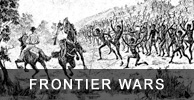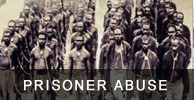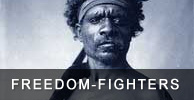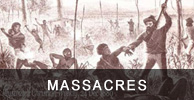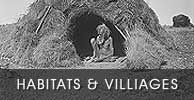Lest We Remember: the Australian War Memorial and the Frontier Wars
The Australian War Memorial was first advised internally to acknowledge the frontier wars way back in 1979. Our military historians accept that colonial conflict is part of our military history, but the Memorial still holds out.
Michael Green michaelbgreen.com.au 25 March 2013

Photo: John Torres Source: The Wheeler Centre
Near the end of his latest book, Forgotten War, Henry Reynolds makes a demand: the Australian War Memorial must commemorate the frontier wars.
The book examines Australia's violent colonial history, and reaches into some of our most challenging public debates - about land rights, sovereignty, and reconciliation. But here, Reynolds chooses one simple theme:
A critical question is whether the Aboriginal dead will ever be admitted to the sacred centre of white Australian nationalism, the Australian War Memorial. If they are excluded in death from the pantheon they are excluded from the nation. That is surely axiomatic. We will know that we are all members of the same nation when a shrine in memory of the fallen warriors is placed side by side with the tomb of the unknown soldier.
In September last year, Brendan Nelson, former Liberal Party leader and now the director of the Memorial, addressed the national press club. Reynolds' book had just come out, and ABC journalist Michael Brissenden asked if the Memorial would acknowledge the frontier wars.
Nelson said the story should be told, but by the National Museum, perhaps. 'The Australian War Memorial is not, in my very strong view, the institution to tell that story.'
I interviewed Nelson recently, and he maintained that position. Let's consider his arguments.
'The origins of the war memorial are in the depths of World War I, in 1916, envisioned by Charles Bean our official historian who was with the troops at the front through the entire war. The Australian War Memorial's purpose and function is to tell the story of Australia's engagement in, and experience of, war and other operations on behalf of Australia. It is not the Memorial's function to tell the story of disputes and armed conflicts where they have occurred within Australia,' Nelson says.
The memorial's function is defined by its legislation: the Australian War Memorial Act 1980.
It says that, among other things, the institution must maintain a national memorial of Australians who have died 'as a result of any war or warlike operations in which Australians have been on active service'. It must also disseminate information relating to Australian military history, including that of forces raised in Australia before Federation.
In a public statement late last year, the Memorial argued that under the Act, the definition of its role 'does not include internal conflicts between the Indigenous populations and the colonial powers of the day'.
This is technically true: those battles aren't expressly included. But neither are they excluded. The Act doesn't specify whether the conflicts must be on home soil or overseas. The Memorial's position appears to be a matter of politics and extraordinary inertia, not history.
War Memorial former principal historian: 'If it's not war, what is it?'
Peter Stanley began working at the Australian War Memorial in 1980, and from 1987 until 2007 he was its principal historian. He's written 25 books, and is now a professor at the University of New South Wales, at the Defence Force Academy in Canberra.
Stanley says the question of whether the Memorial should recognise frontier conflict was first raised by Geoffrey Blainey in an internal report in 1979, and Stanley himself presented a paper on it in 1981.
He argues that the institution's public position is based on a narrow reading of its legislation and a flawed view of history.
'The Act does allow the Memorial to deal with "warlike" actions - and frontier conflict looks warlike to me: as I asked in 1981, If it's not war, what is it?‘ he says.
'I gave the same advice as principal historian, but it was declined. It has come up repeatedly during the terms of successive directors and governments, but has been either outright rejected or avoided as too hard.'
Brendan Nelson: ‘It's questionable whether there was a declared war in Australia’
This is what Nelson says:
'It's questionable whether there was a declared war in Australia, a war declared by the colonies against Indigenous people. After the British garrisons left, the violence where it did occur was from police militia, colonial militia and Indigenous militia.'
This position is decades out of step with historical scholarship, Stanley says. 'Australia's military historians have long accepted that frontier conflict was a part of Australia's military history. No military historians I know take the opposite view.'
In its public statement, the Memorial said it had 'found no substantial evidence that home-grown military units, whether state colonial forces or post-Federation Australian military units, ever fought against the Indigenous population of this country.'
This, Stanley says, is 'historically simply wrong'.
'Military forces raised in Australia did prosecute war against the Aborigines: the (Military) Mounted Police - which perpetrated the Slaughterhouse Creek massacre of 1838, for example - was raised in Sydney in 1825, so the Memorial is plain wrong to argue that there weren't any soldiers raised in Australia which conducted the frontier war.'
'But this is just legalism. An armed conflict occurred across the pastoral frontier for about a century: don't tell me that that's not an actual military conflict. It resulted in more than 30,000 deaths and involved the British army. To try to find legal reasons why it isn't recognised is just logic-chopping and pedantry.'
Nelson, who began his directorship in late 2012, says he won't discuss the Memorial's internal deliberations. But the circumstances are exceptional: a publicly funded institution appears to have rejected expert advice for more than three decades. In the name of transparency, it should open its archive.
'Charles Bean was determined it should be a place of commemoration, of national unity. He wanted it to be a place that had a spiritual ambiance for the men of the 1st AIF and the women as nurses, as they were then,' Nelson says. 'It's simply inappropriate for the Australian War Memorial to be telling the story of violent armed conflict between Indigenous and non-indigenous people.'
Here, Nelson seems to make two arguments: that commemorating the frontier wars would upset the atmosphere of the Memorial; and that it must remain true to Bean's original vision.
'You can't always cheer your history'
The history of the frontier wars has certainly been divisive - in part, because our history remains little known among the community. But it need not always be so. Indeed, Reynolds argues his case in the name of national unity.

Bean was adamant the Memorial must not glorify war. Given the significance of their fight for the land and the ongoing repercussions of colonisation, a shrine to the fallen warriors would surely pass that test.
What's more, David Stephens, secretary of the Honest History website (Peter Stanley is the president), points out that we already recognise the Turkish resistance to the Diggers. On Anzac Parade, opposite the Memorial, is the Ataturk Memorial Garden, featuring a bust of Kemal Ataturk, commander of Turkish infantry at Gallipoli and, later, the first president of the Republic of Turkey.
Bean first spoke of his notion for a memorial while on the battlefield at Pozières in the Somme valley. But we can't hold time still on his vision: the horse has bolted, and turned into a light armoured vehicle. Bean wanted a memorial to commemorate the forces in World War I. Then World War II happened. His vision had to change even before the Memorial opened in 1941.
The Memorial has changed as the years and decades have passed, and now commemorates several wars both before and after World War I, as well as our peacekeeping missions.
'I think the War Memorial's council fears that acknowledging the truth of frontier war will somehow bring Anzac into disrepute,' Stanley says. 'But the two are completely separate.'
'It is not an aspect of Australia’s military history that Australians take pride in, but you can’t always cheer your history - sometimes you just have to accept it.'
'We don't want to be stuck alongside you mob'
In September last year, during his address at the press club, Nelson said that the Australian War Memorial 'represents the soul of our nation'.
'It is about our past, it is about our history, but more importantly it's actually about our future. A people that neither knows and nor, more importantly, understands its history, in my view, is dangerous,' he said.
Nelson was thinking about World War I, and all those cemeteries and battlefields he visited while he was the ambassador to the European Union and NATO.
But he has returned to the wide brown land. There is a military history here that must be known and understood too, and the Memorial's council has a unique responsibility to help us remember and interpret it. If one day it comes to pass, the shrine to the fallen warriors may primarily serve non-Indigenous Australia, for its understanding and education.
The Australian War Memorial is on Ngunnawal land. I asked the United Ngunnawal Elders Council what they thought of Reynolds' proposition, but they have not yet considered the issue. It need not be the only place.
I also spoke to playwright Jim Everett, a Plangerrmairreenner man, of the Ben Lomond people in northern Tasmania. 'If they asked me, I'd say "no we don't want to be stuck alongside you mob - we had to fight you". If we want to remember our heroes, then we should be doing it ourselves,' he says.
'We should be dedicating a part of country to our fallen heroes - perhaps we could mark it with a rock. I don't like the idea of statues.'
Wurundjeri elder Bill Nicholson is adamant that Australia should recognise that Aboriginal people fought for their lands. 'It would be great to commemorate Aboriginal warriors - I'm just not sure yet if the War Memorial is the appropriate spot,' he says.
Reynolds has also suggested Aboriginal land councils throughout the country consider if they'd like to establish memorials, and if so, receive the funding to do it.
Nicholson approves. 'I would love to see our freedom fighters commemorated everywhere over Wurundjeri country,' he says. 'We're still fighting for the same country today. The battle goes on. It hasn't ended.'
Michael Green is a freelance journalist who writes about environmental, social and community issues.

